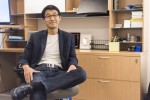If Vice Chancellor Jerry Kang was a presidential candidate, he would be John Kasich. They’re both voices of relative sanity among the politically divisive and unconstructive noise around them that we should all make an attempt to listen to, regardless of our own views. But one difference between the two is that you know far more about Kasich than Kang and his office.
Kang is the first vice chancellor of the Office of Equity, Diversity and Inclusion, appointed in March 2015. Over the past 12 months, he has faced a range of incidents on campus – the Kanye Western party, David Horowitz posters and the transgender photo controversy, to name a few. And while Kang has adequately responded, his office can go further – it needs to reach a sizable portion of the student body to have an impact.
One example of Kang’s insufficient outreach is CrossCheck. Last October, Kang established CrossCheck as a blog-like platform to address students in the wake of the Kanye Western party incident, in an attempt to “flip the script” and “learn something new.” His purpose was to communicate with the student body in a conversational style, something unheard of for a university administrator. Kang has explained that the site, which currently consists of six posts on campus incidents, is meant to be a hub for information on discrimination to deepen the conversation on equity at UCLA.
He also said that the platform would be aimed at undergraduate students, but it seems unlikely that he’s reaching more than a small number of students who take an active interest in such matters.
Take, for instance, the most recent CrossCheck post on the transgender photo controversy. When asked about it, Alexander Rhim, president of Bruin Republicans, said that he had not seen the post. “I had not heard that he had published anything on the issue,” Rhim said.
It seems counterintuitive if a post, aimed specifically at students of a particular organization, goes unseen by the president of that organization. Rhim isn’t at fault here. Kang’s office is responsible for not expanding the reach of his CrossCheck posts. The main way he announces his newest CrossCheck posts is through his personal Twitter account, which has 298 followers, where he also conveniently forgot to include any mention of his fifth post.
In essence, Kang’s posts, intended for the entire student body, don’t reach enough students. That’s not a public platform to discuss equity; it bears far more resemblance to an aspirational personal diary against bigotry that a select few have managed to stumble upon.
This is disappointing, considering that Kang has made some insightful comments in his posts in a more cordial and conversational tone. Although his office is inherently biased against intolerance, his posts include explanations about how the First Amendment works, which some UCLA students are evidently in need of.
In an email, Ricardo Vazquez, associate director of UCLA Media Relations and Public Outreach, said that the office uses various channels to reach out to students, such as giving talks to groups of students across UCLA. Instances include Kang speaking at the 2016 Diversity Symposium and at an event hosted by UCLA Residential Life on Asian-American and Pacific Islander heritage, and the EDI office co-sponsoring programs on gender and transnational issues. These are praiseworthy efforts, but they apply to niche audiences. The office should be targeting the demographic that doesn’t involve itself in groups that have already been concerning themselves in matters of equity and diversity.
The need for students to know about the work of the office has been underlined by Kang himself. In December, he said that work needed to be done to educate students on equity. The words of the office may not have much of an influence on those who are already aware of race issues nor can they influence those who have already set their opinions in stone. It can, however, impact students currently unaware that the office even exists, and educate them on the significance of race issues and free speech on campus.
An appropriate way for the office to expand its outreach would be through the Student Advisory Board it plans to set up. Kang announced in an email
Additionally, it would help if the board had more than one meeting a quarter as equity isn’t something that pops up every three months. Holding more meetings would help the board successfully carry out its communication with the UCLA community. While giving the board its autonomy, Kang should also use it as an extension of himself and the office and help it expand its outreach to students.
Furthering its outreach would also help the office improve the response to its programs. One such program is the Bruin Excellence and Student Transformation Grant Program, which will provide funding to 14 different student-run projects based on diversity, retention or campus climate.
For a department in its infancy stages, the EDI Office needs to make outreach one of its main priorities. By setting up a base for people to be aware of its existence, the office can engage a larger conversation on campus on equity and free speech. For the six figure salary Kang receives, it’s only fair that this happens.
